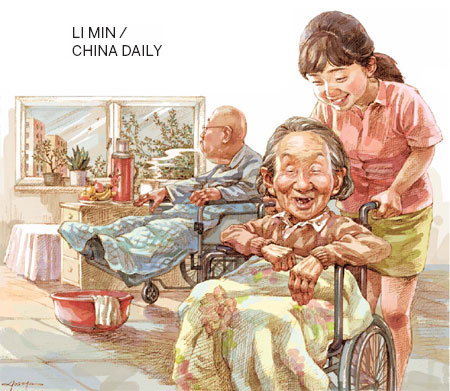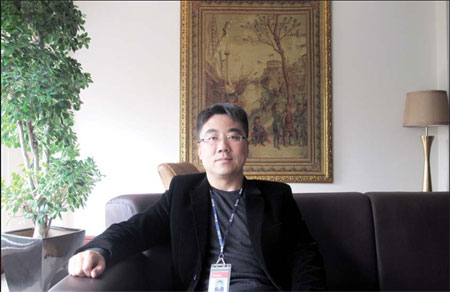Homes for the aged
Updated: 2013-05-10 08:45
By Sun Yuanqing (China Daily)
|
|||||||||||

|
Gao Junsong, general manager of Golden Heights, says demand for senior-care services is huge. Sun Yuanqing / China Daily |
Huge demographic shift in China is throwing up opportunities that are just as huge for Western firms
Though it took her several months, Lv Xuejing considers herself extremely fortunate in getting private nursing care for her elderly father in Beijing from a private operator.
Lv's predicament was understandable considering that she had to balance her busy work schedule and also double up as nurse and caregiver for her 90-year-old disabled father. Much to her chagrin, there were hardly any government nursing homes or companies in Beijing that she could turn to for elderly care treatment.
Though she knocked on the doors of several institutions like the Beijing No 1 Social Welfare Institute, one of the best government-run nursing homes in China, Lv was told she would have to join a waiting list that ran into several thousand.
"It would have practically taken more than 100 years before I could even think of admitting my father," the 55-year-old university professor says.
After numerous phone calls and endless networking, Lv finally found a government-subsidized nursing home run by a private operator, which charges 5,000 yuan ($810; 615 euros) a month.
Lv counts herself as extremely lucky. "The conditions are not very good, but they provide round the clock care, which is very important for my father," she says.
Discussions on China often center on its size and economy, but rarely dwell on its changing social and market dynamics like its demographic problems, nor the opportunities that presents. Lv's story points to how China is fast becoming the global hot spot for the business of aging and triggering opportunities for domestic and Western businesses.
To understand the aging business in China, it is important to also juxtapose the big numbers. The country now has a population of more than 1.3 billion that is expected to start shrinking by 2030.
According to statistics from the Chinese Academy of Social Sciences, the number of those over 60 will reach 200 million in China this year, accounting for 14.8 percent of the total population. The number will increase by 10 million every year until 2025, making it the fastest increase in Chinese history.
A country is considered to be aging when 7 percent of its population is over 65, or 10 percent of its population is over 60, the United Nations says.
"The private sector will have a greater role to play in senior care and housing in China. In fact, they must take the lead, considering the limited resources the government has," says Yang Yansui, director of the Research Center of Employment and Social Security at Tsinghua University.
|
||||
Because of the family planning policy implemented in the 1970s, China is experiencing the 4-2-1 family model, meaning a typical only child will have to care for two parents and four grandparents. That also means the traditional way of aging at home comes with more challenges.
With rising living standards and better healthcare, people in China are also living longer. One third of the population, or 438 million people, will be over 60 by 2050, the UN says. That would equal the entire population of the US at that time.
However, public senior-care facilities in China at the moment are far from enough to meet these projected demands. By 2010, China had 3.5 million nursing beds, catering to less than 2 percent of its senior population. In developed countries, the figure usually stands at 5 to 8 percent.
More than half of the world's aging countries have reached more than $10,000 GDP per capita when they were first considered aging. But China reached the threshold in 2000 at less than $1,000 GDP per capita.
Recognizing the severity of the issue, the government has listed senior care as one of the priorities in its 12th Five-Year Plan (2011-15), and is encouraging more private capital in the sector.
China will increase the number of nursing beds to accommodate 3 percent of the aging population by 2015, the plan says.
The plan also estimates that the market value for senior care will reach 450 billion yuan by 2015 and create more than 5 million jobs.
Apart from the opportunities presented by the rapid changing demographics and the supporting policies, China's lack of experts and operators has also made it a particularly appealing place for prospective investors.
"Right now, we are in a position where we are relatively rare in what we can do," says Cole Wright, development director of Merrill Gardens, a senior-housing operator from the US, which has recently opened a branch in Shanghai.
"We've been working in a competitive market in the US for quite some time because it's already a very mature market. China is a very important growth market with more opportunities than elsewhere," he says.
Related Stories
Waiting for competition 2013-05-10 08:45
Cherishing the moment 2013-05-10 08:45
Hard lessons from the US 2013-05-10 08:45
Long road ahead 2013-05-10 08:45
Today's Top News
List of approved GM food clarified
ID checks for express deliveries in Guangdong
Govt to expand elderly care
University asks freshmen to sign suicide disclaimer
Tibet gears up for new climbing season
Media asked to promote Sino-Indian ties
Shots fired at Washington Navy Yard
Minimum growth rate set at 7%
Hot Topics
Lunar probe , China growth forecasts, Emission rules get tougher, China seen through 'colored lens', International board,
Editor's Picks

|

|

|

|

|

|










